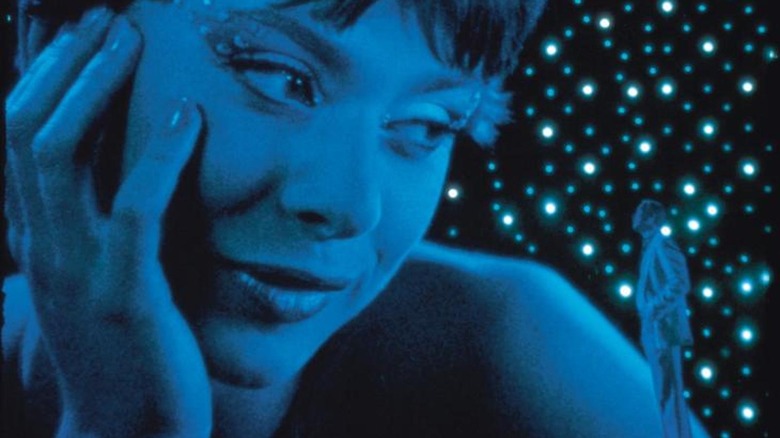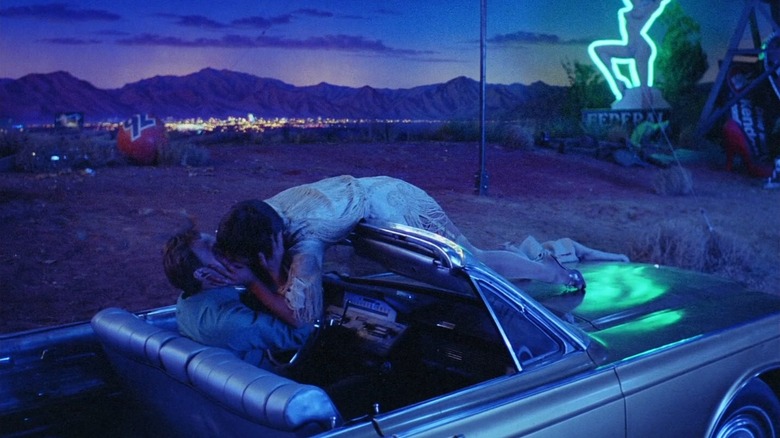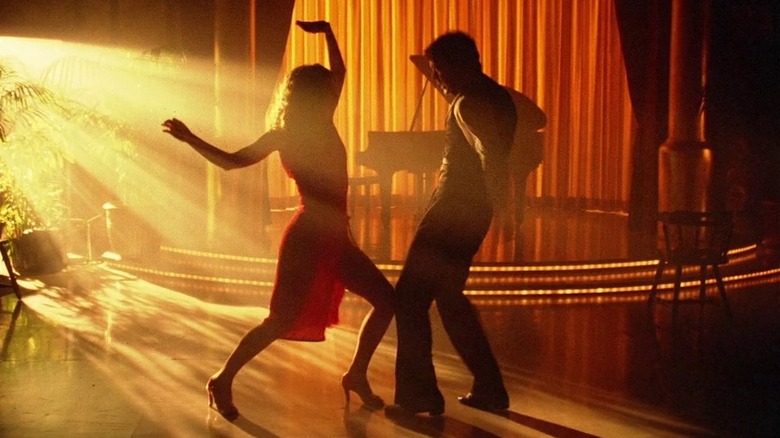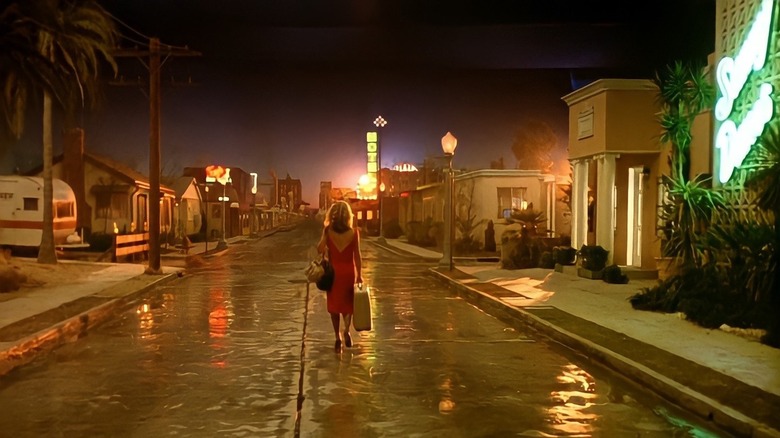The Box Office Flop That Nearly Ended Francis Ford Coppola's Career (But Is Actually Great)
Francis Ford Coppola's 1982 musical "One from the Heart" opens with the rattle of a roulette pill over a black screen. The shouts, dings, hopes, and lamentations of the casino are nowhere to be heard. It's just that damn ball clattering across that spinning wheel, daring bettors to pick a number and a color. When the rotation slows, and the pill finds its slot, the red-light logo of Zoetrope Studios cuts through the dark of the theater.
Coppola's wager? Everything. He'd pushed all-in on the outsized dream of an artist-controlled movie studio nestled in the heart of Hollywood. Everyone who bought a ticket to see the film on opening day knew that the most celebrated filmmaker of the 1970s had risked it all to revolutionize an exclusionary industry. He wanted every craftsperson of every creed/color/class to soar as far as their talent would take them, to know that the people with the money cared more about the art than the business. He wanted to democratize the most influential creative medium of the 20th century because the more palpably people of different backgrounds connected with their fellow human beings, the better we'd understand each other. He wanted utopia.
And every person who took a seat in those sparsely populated theaters 42 years ago knew he'd already gone bust.
"One from the Heart" was a fiasco. Critics derided the $26 million production as a cold-hearted technical exercise. Why had the director who'd helped rescue Hollywood from its old-school excesses made what was essentially the kind of laden backlot musical audiences had rejected over a decade ago? Moviegoers caught the stench and stayed the hell away.
"One from the Heart" was quickly pulled from theaters after posting a paltry $636,796 gross in the United States. Coppola's dream was dashed. He'd bet on red and spent the next two decades taking for-hire gigs to cover to scurry back into the black. He found solvency in the wine business, but this one-time lion of a filmmaker lost his roar. And this is a tragedy because "One from the Heart" was only ever a triumph. And starting on January 19, you can experience its sui generis beauty in theaters via a new director's cut.
Coppola returns to the site of his near ruin
"Director's cut" may be the wrong term. Coppola already trimmed the film for its early 2000s DVD release, and he's jettisoned around six minutes from this version. This new iteration is titled "One from the Heart: Reprise." If you're a fan of the film, it's essentially the same movie save for one fairly significant alteration, one I'm still mulling.
Before I wade into the weeds, let me assure newcomers that "One from the Heart: Reprise" works splendidly on its own. It's still the woozy tale of two Las Vegas lovers whose dreams have diverged. Frederic Forrest's Hank is a grounded mechanic who wants to set down roots in Sin City, which flusters Teri Garr's travel agent Frannie, who yearns to see the world (specifically Bora Bora). Hank believes they can build their own little paradise in the modest two-story house they share; Frannie views it as a starter house that you flip on the way to finding your palace. When they can't reconcile their world views over an anniversary dinner (at home, against Frannie's wishes), they hit the Vegas strip in search of someone who gets them.
The conflict is unabashedly shopworn. Frannie gets swept off her feet by a playing-at-worldly lounge singer (Raul Julia, who gets an all-time great entrance on par with Omar Sharif riding out of a mirage in "Lawrence of Arabia"), while Hank goes gaga for a blindingly beautiful circus performer (Nastassja Kinski). We've seen this movie, and Coppola knows it. The difference is the aesthetic.
Brecht is better
Coppola anticipated the pre-visualization future of big-budget filmmaking with his "electronic cinema" concept, which allowed him to map out the movie shot-for-shot via a videotaped storyboard. This allowed him to stage visually complicated one-takes where Forrest and Garr could play moments alongside and, in a way, together against a semi-transparent scrim. It's a Brechtian notion that pointedly calls attention to the artifice of filmmaking, but backlot musicals are artificial. Everything artists create, including documentaries, employs some degree of sleight-of-hand. Coppola leans deep into this and draws us into the erotic reveries of his characters.
Because unless you're making "Umberto D," photoreal is for hacks.
Ones and zeros aren't evil, but they do present no-talents with an artistic cheat code; at some point over the next century, Joe Russo's dream of dudes being able to screw Marilyn Monroe in their living room will become a reality. It will feel close to real, which means it will be cheap and shameful. The handmade spectacle of "One from the Heart," where talented performers sing and dance according to their characters' abilities – Forrest's earnest, off-key croaking of "You Are My Sunshine" is sublime — in films with big-budget production value was an impossible future. Still, I'd take it over the ones-and-zeros of "Jurassic Park."
But that dream is so very dead.
Take us home, Francis
"One from the Heart" might've stood a better chance with mainstream moviegoers had Julia and Kinski turned up earlier in the film. Coppola addresses this issue in "Reprise," but while his instincts are spot-on, there's only so much he can do with the available footage.
The big blow-up between Hank and Frannie gets kicked forward into the movie. They've encountered their paramours prior to their anniversary dinner spat, which energizes the narrative. But this also underscores the script's fundamental flaw: Hank and Frannie are never more than archetypes. Dean Tavoularis' production design is unusually lived-in for a backlot musical, but Forrest and Garr never truly feel at home in the space he's created. My sense is that they needed more rehearsal time (and probably a dialogue polish) to inhabit this intentionally unreal world more comfortably. But you excuse these shortcomings because, my god, this is a beautiful film.
Cinematographer Vittorio Storaro's neon-soaked vision of a prefab Vegas is Vincente Minnelli would've knocked Nicholas Ray into a sugar coma — which means "One from the Heart" is, per Jean-Luc Godard's formulation, cinema. Tom Waits' music conveys the weariness of round-the-clock Vegas. The city pops if you spend a couple of days there, but living there is a 24-7 lie. Then again, so is life, everywhere, all the time. Hank and Frannie just want to carve slivers of happiness here and there. Maybe the house will do the trick. Probably not. But you only go around once, so what's the harm in dreaming?
Coppola sold his vineyard to dream possibly his final, extravagant dream. I don't care if "Megalopolis," the $100-million-plus epic he personally financed, isn't "Apocalypse Now." I care that the maestro placed the heaviest of bets to see if that pill might find the right slot one last time.



